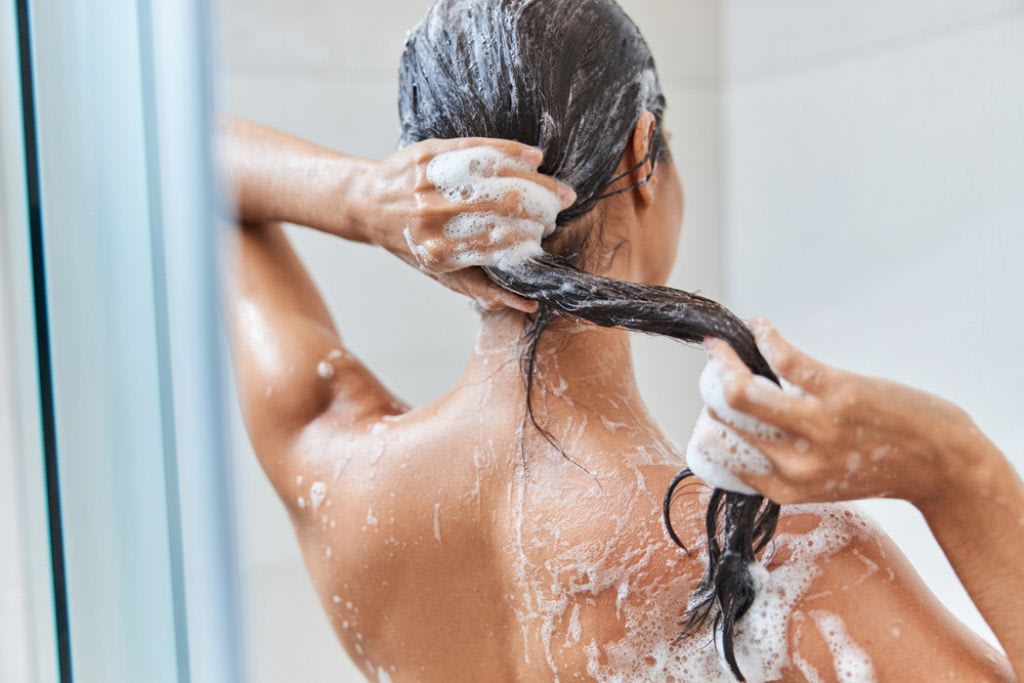How Often Should You Wash Your Hair?

December 14, 2022 - Updated December 14, 2022

It’s an age-old conundrum: how often should you wash your hair? But as much as we would love a straightforward answer, it’s not that simple when there isn’t one single type of hair, woman or lifestyle.
It doesn’t make sense to give the same hair-washing advice to someone who sweats heavily, has thin hair and works out four times a week if you’re someone who has thick, dry curls and doesn’t sweat much at all. So how do you know what’s right for you and when does your lack of washing become a bit yuck or even damaging to your hair? Here’s what you need to know to optimise your hair washing cycle.
Factors at play
According to the Cleveland Clinic, most people wash their hair every 2-3 days, while others opt for a weekly wash. Where you sit on this scale will depend on factors such as your age, ethnicity, hair length and texture, climate, occupation and level of physical activity.
For example, the oil glands on your scalp can be more or less active at different stages of life as your hormones change, and the texture and moisture levels of your hair can also be different depending on your genes and ethnicity.
Straight and thin hair often needs more frequent washing, and thick, coarse or Black styles usually need less. Research has even shown that for African American women, the time and resources required to care for and maintain thick, dry styles can be a barrier to exercising regularly, so establishing the right hair care routine can be an important part of your overall wellbeing!
Occupation and other lifestyle factors can also play a role. A landscaper might arrive home with her scalp speckled with dirt, a new mum might finish her day with bits of baby food caught in her locks, or you might use different products to hold your hairstyle in place each day.

Listen to your locks
Rather than following a rule you read somewhere or following what your friends do, it’s best to pay attention to what your locks and scalp are saying. This will help you find a washing frequency that keeps your hair healthy, without overwashing which can strip your hair of its natural oils and irritate your scalp.
Signs your hair needs a wash:
Your hair looks greasy, dull or matted
Your hair has lost its shape or volume
Your scalp is itchy, irritated or flaky
You have a build-up of product on your scalp or hair
Your hair has a stale or unpleasant smell. Over time, bacteria, sweat and yeast can build up on your scalp and hair, producing a funky smell
You’ve got to the point where you’re wearing your hair in a tight bun every single day to hide the sweaty greasy situation from a full week of Sweat workouts. We’ve all been there!
Timing your washes based on these signs might mean you’re washing your hair once every few days, once a week, or opting for a slightly different routine depending on what you have on each week.
Remember, thin or straight hair often needs more frequent washing, while for women with Black hair, it may work best to have a designated hair-washing day each week like Sweat Trainer Britany Wililams does!
If your hair isn’t showing signs of needing a wash, skip it! This will help to retain that natural shine, volume and moisture. If you’re washing your hair more frequently, try to invest in a good quality shampoo and conditioner to avoid your hair becoming overly dry and stripped of its natural oils.

How to go longer between hair washes
To stretch the time between washes, the most obvious option is to use dry shampoo. While it’s definitely not a replacement for real shampoo, it can do the trick for a day or two. Just remember to apply it to your roots when your hair is dry as mixing sweat with dry shampoo can create a cakey mess. In the shower, applying conditioner only to your ends can also prevent your roots from becoming greasy too quickly.
If you’re someone who sweats a lot during your workouts, there are ways to protect your hair from sweat during your training. Try to style your hair in a way that keeps it out of your face and allows more airflow to your scalp like braids, or use a sweat towel, headband or hair wrap.
Between washes, touch your hair as little as possible to reduce the transfer of oils from your hands, wash your pillowcases regularly, brush your hair daily to evenly distribute the oils, and opt for hairstyles like buns and sleek low ponytails when you want to hide greasy roots.
What happens if you don’t wash your hair?
Some people believe that if you don’t wash your hair or just use water, eventually your scalp will adjust and produce less oil, but it’s important to remember your scalp is still just an area of skin like anywhere else on your body. In other words, washing and hygiene practices are still important.
Your scalp will continue to produce oils, not to mention the buildup of dirt, sweat, skin cells and products that can accumulate over time and lead to itching, irritation and smells, as well as ingrown hairs and reduced growth.
A big part of maintaining healthy hair is keeping it fresh and clean, and figuring out a hair-washing frequency that looks after your locks and scalp without stripping your hair of all its natural goodness. For most people, 2-3 times a week will do the trick!

A more empowered you starts with Sweat, and our editorial team is here to bring you the latest fitness tips, trainer recommendations, wellbeing news, nutritional advice, nourishing recipes and free workouts.
* Disclaimer: This blog post is not intended to replace the advice of a medical professional. The above information should not be used to diagnose, treat, or prevent any disease or medical condition. Please consult your doctor before making any changes to your diet, sleep methods, daily activity, or fitness routine. Sweat assumes no responsibility for any personal injury or damage sustained by any recommendations, opinions, or advice given in this article.
Wellbeing